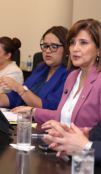The European Union promotes female talent in cybersecurity: five young Panamanian women to take part in the CyberWizards 2025 camp in Estonia

The European Union Delegation in Panama welcomed five young Panamanian girls last Tuesday, selected to participate in the international cybersecurity camp CyberWizards 2025, which will be held in Estonia from 11 to 16 August. This initiative, aimed at girls aged 13 to 16 with no prior coding experience, seeks to foster their interest in technology through workshops and practical challenges.
H.E. Izabela Matusz, Ambassador of the European Union, welcomed the five girls and their guardians to the Delegation in a meeting that also featured the participation of María Heller, Director of Innovation in Science and Technology Learning at SENACYT; Nicole Lasso, Coordinator of the National Network of Clubhouse Corners; and Nicole Palacín, Coordinator of the “Mentes Brillantes” Clubhouse Corner, who will accompany the group to Estonia. Representatives of the Latin America and Caribbean Cyber Competence Centre (LAC4), Adria Méndez and César Moline, also joined the event virtually. Participation in the camp is funded by the LAC4 Centre, which is part of the EU CyberNet project and reflects the European Union’s commitment to cooperation and stronger ties with Latin American and Caribbean countries, based on shared values.
In her address, the Ambassador highlighted the European Union’s commitment to gender equality and the empowerment of women in science, technology, and cybersecurity, in line with the EU Gender Action Plan III (GAP III), which promotes a structural shift towards equality in all EU external actions. She also emphasised that this camp "is not only an opportunity to learn new skills, but also to discover what you are capable of achieving," encouraging the girls to be curious, courageous, and confident in their creativity and talent to help build a more inclusive and resilient digital future.
During the event, LAC4 representatives reflected on the need to promote diversity as an essential value for the development of fairer and more effective technologies, and highlighted the symbolic value of Tallinn as a medieval city turned global benchmark for digital innovation. For her part, María Heller explained that the five scholarship recipients come from different regions of the country and have shown outstanding aptitude in technology-related activities promoted through the Clubhouse Corners managed by SENACYT, which provide young people aged 3 to 18 access to tools such as robotics, 3D design and programming.
Among the participants, Daniela Camargo from Pacora shared how her interest in robotics began in 2021. Her mother, Yadisel Camarena, movingly remarked that “when the pandemic began, we barely knew how to copy and paste. Now, Daniela is already programming.” Meanwhile, Janna Ramos from Tocumen explained that, at the beginning of her first robotics course, “she understood nothing and did not feel she belonged”, but she persevered and is now excited about this international opportunity.
The event concluded with Ambassador Matusz’s call to build a global network of “cyber girls” as an instrument of transformation in favour of a more equal and secure digital citizenship, encouraging the five young Panamanian participants to become role models for a new generation of women leaders in technology.





